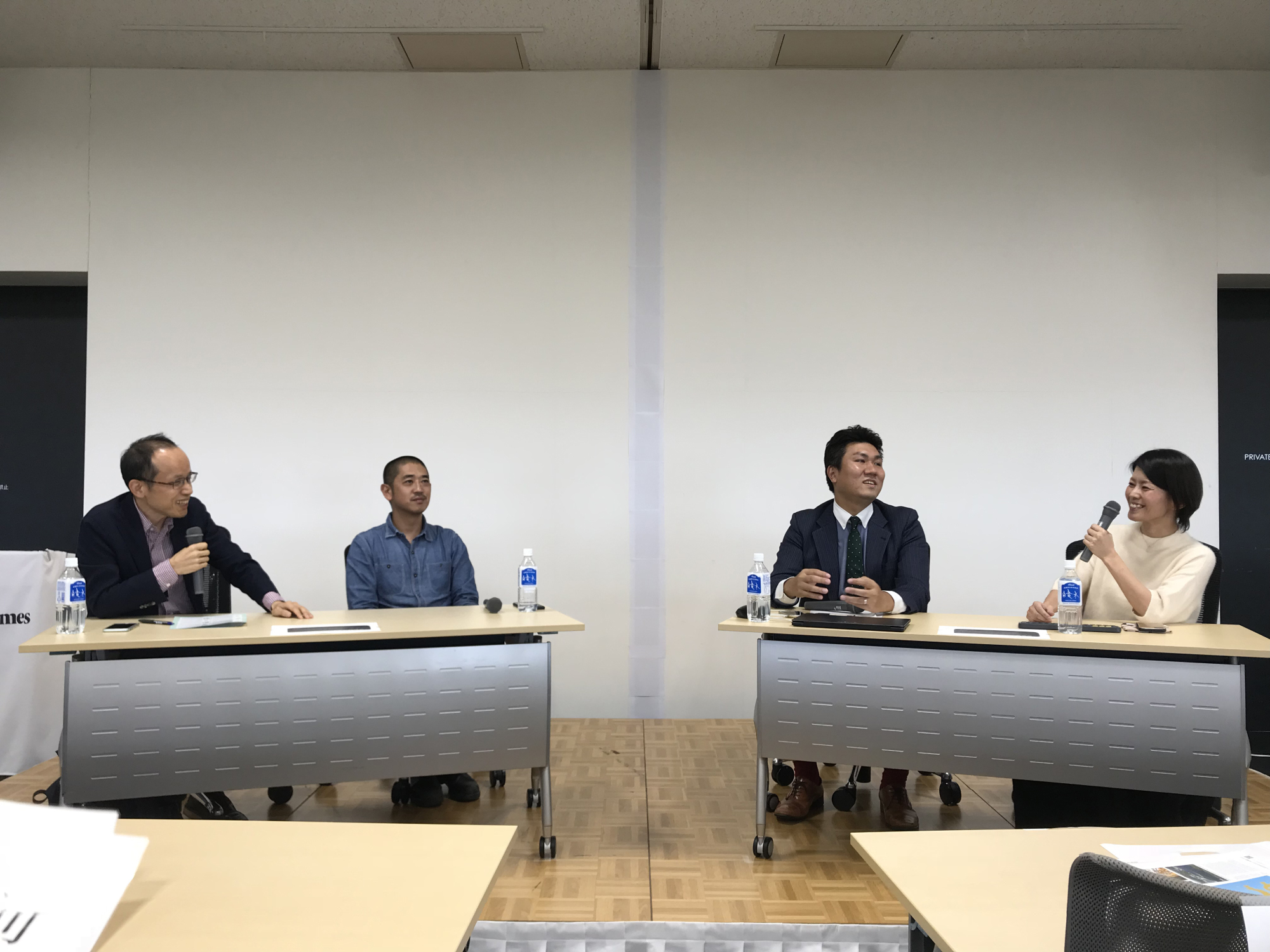The Japan Times Satoyama Consortium, the Chugoku Region Governors Association and the town of Jinsekikogen in Hiroshima Prefecture co-hosted a two-day event at the Jinseki Kogen Hotel on Oct. 20 and 21.
Among the topics discussed that centered around satoyama (mountains and woods shared and maintained by residents of the adjacent rural communities) and satoumi (marine and coastal environments where biodiversity is maintained through human intervention), the first session on Oct. 20 featured the theme of starting businesses to capitalize on satoyama and satoumi.
With Haruo Miyagi, founder and CEO of nonprofit ETIC., as a facilitator, three panelists shared stories of their businesses that make effective use of regional resources.
Food Hub Project Inc. Chief Operating Officer Taichi Manabe moved to the town of Kamiyama in Tokushima Prefecture a few years ago and started running a restaurant, bakery and grocery store, as well as developing processed foods and providing food education.
"There is agriculture behind all of our projects," said Manabe. "Through what we do, we eat with the local community what we create with the local community," he said.
Food Hub Project brought 28 new residents, including children, to the area and three of those people took up farming in the otherwise aging community.
Akiyoshi Moriyama is the senior coordinator of Misogigawa Co. The company is an excellent example of the private sector running and leading regional promotion of the city of Nanao on Ishikawa Prefecture's Noto Peninsula.
Misogigawa's projects are uniquely named. One of their projects, "Noto no Jinji-bu," meaning "human resource department of Noto," is an outsourced platform of human resources for small- and medium-sized enterprises in the region.
"Ureshi! Tanoshi! Shimanagashi!" ("Happy! Fun! Being exiled!") is a series of hands-on activities to experience the lives of the people of Noto to promote tourism and boost the number of incoming residents. The eye-catching name refers to the historic fact that Noto Island was a place of exile during the Edo Period (1603-1868).
Mika Watabe, CEO of Mu Inc., has been running a confectionery shop of all things strawberry in Kyoto for 15 years. Her shop, Maison de Frouge Ichigo no Omise, sells a variety of cakes and sweets featuring strawberries of diverse brands and origins year-round.
She opened a new shop in the village of Nishiawakura in Okayama Prefecture, where she also plans to set up a research center to develop and produce summer strawberries.
"To me, it is more exciting to dig deeper than to expand by franchising. I spent my time really focusing on strawberries, which gave me connections to strawberry producers from across Japan and opportunities to collaborate with research bodies," said Watabe.
Asked about the interaction with the locals as someone who migrated from outside the town, Manabe said that Food Hub Project issues a monthly newspaper and has it inserted in the Tokushima Shimbun, a local newspaper, to reach out to around 1,470 households in the area.
"Whether they like us or not, the attention from local people encourages us most," Manabe said.
He is now planning more projects that involve the community, such as reviving local sake for the first time in 40 years and restarting wheat production in the area using old, indigenous wheat seeds.
Moriyama, on the other hand, is originally from Nanao, where he currently runs his business after being away for several years to attend university.
From his point of view as a supporter of the people who migrate or return to rural areas, he said: "The land of the nation should not be shackled by the framework of municipalities. It is a continuation of people's habitats. Measures to restore various cultures and environments for people to continue living in or move to rural areas are necessary."
Watabe said that she travels all across Japan to visit strawberry farmers.
"The taste differs depending not only on brands, but also on farms. I attended an international fruit trade show in Berlin two years ago and tried different kinds of strawberries from around the world there, and I learned how little is known about Japanese strawberries," she said.
Watabe hopes to promote strawberries produced in Japan overseas, connecting Japanese strawberry farmers and the world.
Miyagi concluded the session by saying that starting a new business is one option to create new jobs in a region, requiring a variety of support from the local community.
This series introduces municipalities and local companies promoting the beauty and excellence of deep Japan.



















With your current subscription plan you can comment on stories. However, before writing your first comment, please create a display name in the Profile section of your subscriber account page.